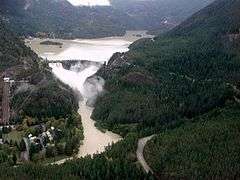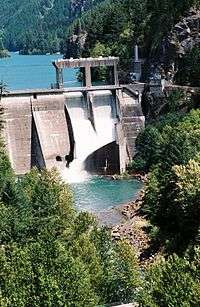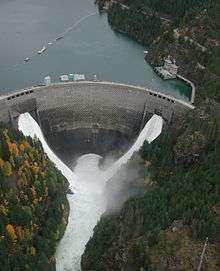Skagit River Hydroelectric Project
|
Skagit River and Newhalem Creek Hydroelectric Projects | |
 | |
 | |
| Location | Whatcom County, Washington |
|---|---|
| Nearest city | Newhalem, Washington |
| Area | 42 acres (17.0 ha) |
| Built | 1917 |
| Architectural style | Classical Revival, Bungalow/craftsman, Other, Industrial |
| MPS | Hydroelectric Power Plants in Washington State, 1890--1938 MPS |
| NRHP Reference # |
96000416[1] (original) 11000016 (increase) |
| Significant dates | |
| Added to NRHP | April 26, 1996 |
| Boundary increase | February 11, 2011 |


The Skagit River Hydroelectric Project is a series of dams with hydroelectric power-generating stations on the Skagit River in northern Washington State. The project is owned and operated by Seattle City Light to provide electric power for the City of Seattle and surrounding communities.
In 2012, hydro-electric dams provided approximately 89.8 percent of the electricity used in Seattle.[2] The Skagit Hydroelectric Project alone accounts for about 20 percent of Seattle City Light's electricity.
The three major dams in the Skagit River Project are (from lower to upper) Gorge Dam, Diablo Dam, and Ross Dam. The dams are located in Whatcom County above the town of Newhalem, which lies just west of North Cascades National Park. Ross Lake, formed by Ross Dam extends into British Columbia, which is 20 miles upriver from the dam. Ross Lake National Recreation Area surrounds the lake.
Construction of Gorge Dam 48°41′52″N 121°12′30″W / 48.69778°N 121.20833°W began in 1921 and the first power was delivered to Seattle in 1924. The cost of the dam was $13 million ($153,339,181 in 2006 dollars).[3] In 1961 a new Gorge High Dam was completed (300 feet, 91 meters) to replace the original Gorge Dam. This dam was featured in Alan Pakula's 1974 thriller The Parallax View, starring Warren Beatty.
Construction of Diablo Dam 48°42′51″N 121°07′52″W / 48.71417°N 121.13111°W was begun in 1927, five miles upstream from Gorge Dam. Diablo Dam was completed in 1930, and at that time was the tallest dam in the world at 389 feet (119 meters) until Owyhee Dam was built. However, the dam produced no electricity for Seattle until 1936.
Construction of Ruby Dam 48°43′54″N 121°04′02″W / 48.73167°N 121.06722°W at the Rip Raps below Ruby Creek began in 1937. This dam was renamed Ross Dam after the death of James Delmage Ross (1872–1939), the superintendent of the Skagit River Project. Construction of Ross Dam was to take place in three stages and the first stage was completed in 1940. The second and third stages were completed in 1953 when the dam was built to its final height of 540 feet (165 meters).
All three dams were listed in the National Register of Historic Places.
Hydroelectric power capacity
| Dam | Power (MW)[4] |
|---|---|
| Gorge | 199.2 |
| Diablo | 159.3 |
| Ross | 352.6 |
| Total | 711.1 |
References
- ↑ National Park Service (2010-07-09). "National Register Information System". National Register of Historic Places. National Park Service.
- ↑ "Fuel Mix - How Seattle City Light electricity is generated". Seattle City Light. Retrieved 11 March 2014.
- ↑ Dollar worth calculator at the Federal Reserve Bank of Minneapolis
- ↑ Seattle City Light
Sources
- Historylink.org
- Seattle City Light Skagit Tours
- Larry Kunzler Historical Record of Dam Building and their Impacts on Floods of the Skagit River: 1924 through 1968
- Guide to the Seattle City Light Gorge Development Project Photographs and Photograph Albums 1948-1962
- Guide to the Seattle City Light Skagit Project: Diablo Dam Construction Photograph Albums 1919-1936
- Guide to the Seattle City Light Ross Dam Photograph Albums 1938-1948
- Guide to the Seattle City Light Skagit Youth Camp Records 1991-1996
- Nearby construction era photo, as the Ross Dam was being completed in 1956
- Tour boat on the lake formed by the Diablo Dam, during the construction era
- Construction photo of what became Ross Dam
External links
- Photosynth view from the Ross Dam wall (requires Photosynth)
- Seattle Power and Water Supply Collection, images of Skagit River Hydroelectric Project - University of Washington Digital Collection